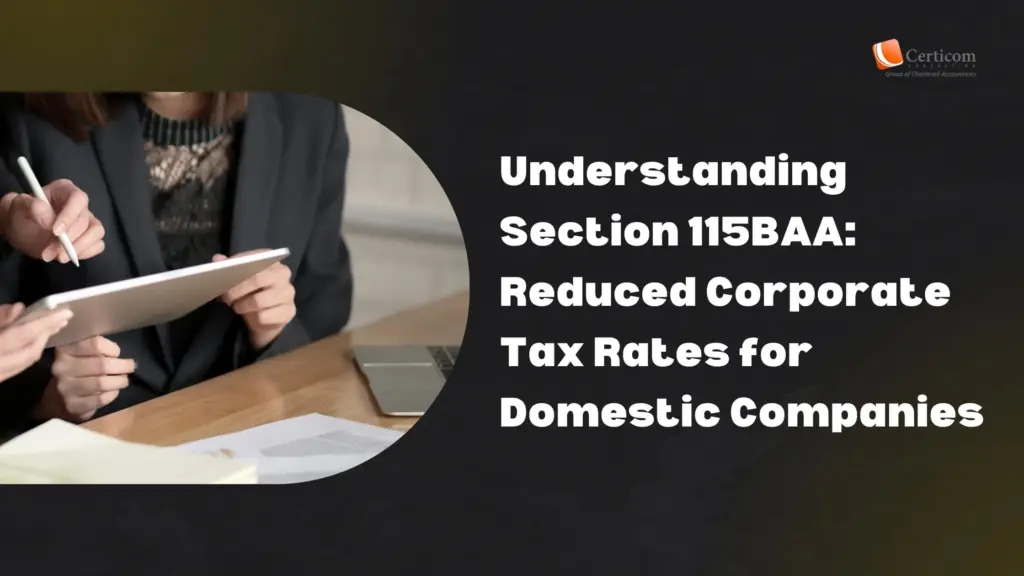Understanding Section 115BAA: Reduced Corporate Tax Rates for Domestic Companies

Section 115BAA of the Income Tax Act, introduced on September 20, 2019, through the Taxation Laws (Amendment) Ordinance, 2019 (later enacted via the Taxation Laws (Amendment) Act, 2019), provides domestic companies the option to avail of reduced corporate tax rates. This article outlines the key features, conditions, and effective tax rates under Section 115BAA to help companies determine its suitability.
Key Features of Section 115BAA
Effective Date
Section 115BAA applies to any previous year beginning on or after April 1, 2019, i.e., from the Previous Year 2019-20 (Assessment Year 2020-21).
Concessional Tax Rate
Companies opting for Section 115BAA are taxed at a reduced rate of 22%. After adding a 10% surcharge and a 4% health and education cess, the effective tax rate becomes 25.17%.

Opting for the Reduced Rate
To avail of this benefit, companies must file Form 10-IC through the e-filing portal before the due date of their income tax return.
Irrevocability of the Option
Once a company opts for Section 115BAA, it cannot revert to the regular tax regime in subsequent years.
Exemption from MAT
Companies under Section 115BAA are exempt from the Minimum Alternate Tax (MAT) provisions under Section 115JB and cannot claim credit for any MAT paid in prior years.
Conditions for Availing Section 115BAA
Income Computation Restrictions
Income must be calculated without claiming the following deductions:
- Section 10AA: Units in Special Economic Zones (SEZs)
- Section 32(1)(iia): Additional depreciation
- Section 32AD: Investment allowance
- Section 33ABA: Deposits in site restoration funds
- Section 35: Deductions for scientific research, biotechnology, or skill development projects
- Chapter VI-A deductions: Except under Sections 80JJAA (employment generation) and 80M (intercorporate dividends)
Restrictions on Losses and Depreciation
- Losses or unabsorbed depreciation arising from the disallowed deductions cannot be set off.
- Losses under Section 72A related to these exclusions are also not permissible.
- Depreciation can be claimed under Section 32, excluding additional depreciation on new plant or machinery acquired after March 31, 2005.

Effective Tax Rates
| Total Income | With Section 115BAA | Without Section 115BAA |
|---|---|---|
| Less than ₹1 Crore | 25.17% | 26.00% |
| ₹1 Crore to ₹10 Crore | 25.17% | 27.82% |
| More than ₹10 Crore | 25.17% | 29.12% |
Key Considerations
Opting for Section 115BAA is an irrevocable decision. Companies should thoroughly evaluate its impact by analyzing their current and future tax liability. The concessional tax regime disallows several deductions and set-offs, which may affect long-term tax planning and profitability.
A detailed cost-benefit analysis can help domestic companies make an informed decision on whether to adopt the reduced tax rate under Section 115BAA.
Related Post
Have You Reported Your Foreign Assets in Your Income Tax Return?
A Beginner’s Guide to E-Filing Income Tax Return for FY 2024-25
Book A One To One Consultation Now For FREE
How can we help? *




